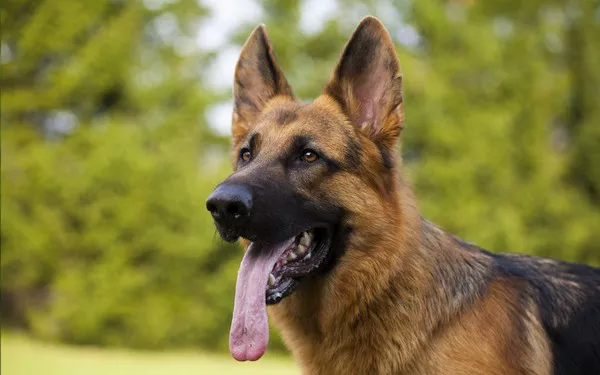German Shepherds, with their noble bearing and remarkable intelligence, are beloved companions for many families around the world. As responsible pet owners, it’s essential to pay close attention to every aspect of their health, including their digestive system. Monitoring a German Shepherd’s bowel movements can provide valuable insights into their overall well-being. In this article, we’ll delve into various factors influencing their pooping frequency, what’s considered normal, and how to ensure optimal digestive health for these magnificent canines.
Factors Influencing Bowel Movements
Several factors can influence how often a German Shepherd poops. Age, diet, health status, and activity level all play significant roles in regulating their digestive system.
Age: The age of a German Shepherd can greatly impact their pooping frequency. Puppies tend to have more frequent bowel movements due to their developing digestive systems and higher metabolism. As they mature into adults, the frequency often decreases, reaching a more stable pattern.
Diet: Diet plays a crucial role in a German Shepherd’s digestive health. A high-quality, balanced diet rich in essential nutrients promotes regular bowel movements. On the other hand, abrupt changes in diet or low-quality food can lead to gastrointestinal upset and irregularity.
Health: Underlying health conditions can affect a German Shepherd’s pooping habits. Issues such as gastrointestinal infections, food allergies, inflammatory bowel disease, or parasites can result in diarrhea, constipation, or changes in stool consistency.
Activity Level: Physical activity and exercise influence digestive health in German Shepherds. Regular exercise helps stimulate bowel movements and promotes overall gastrointestinal motility. A sedentary lifestyle, on the other hand, may contribute to constipation or sluggish digestion.
Normal Pooping Frequency
Determining what constitutes a normal pooping frequency for a German Shepherd involves considering individual factors such as age, diet, and health status. In general, adult German Shepherds typically poop one to three times a day. However, variations within this range can be normal, especially depending on diet and activity level.
Puppies, on the other hand, may have more frequent bowel movements, ranging from three to five times a day or even more. As they grow and their digestive systems mature, the frequency usually decreases.
Puppy vs Adult Pooping Patterns
Puppies have developing digestive systems that require more frequent elimination. They often need to poop shortly after eating, after waking up from a nap, or after engaging in physical activity. As they grow older, their bowel movements become more predictable and aligned with adult patterns.
Adult German Shepherds typically establish a routine for bowel movements, often coinciding with their feeding and exercise schedules. However, changes in diet, health, or routine can affect their pooping patterns.
Diet and Nutrition
The importance of diet and nutrition cannot be overstated when it comes to a German Shepherd’s digestive health. A well-balanced diet consisting of high-quality protein, healthy fats, carbohydrates, vitamins, and minerals is essential for optimal digestion and regular bowel movements.
Feeding your German Shepherd a diet appropriate for their age, size, and activity level can help maintain healthy pooping habits. Avoid sudden changes in diet, as this can disrupt their digestive system and lead to gastrointestinal issues.
Considerations such as food allergies or sensitivities should also be taken into account when selecting a diet for your German Shepherd. Consulting with a veterinarian or canine nutritionist can provide valuable guidance in choosing the best food for your dog.
Health Conditions Affecting Frequency
Various health conditions can impact a German Shepherd’s pooping frequency and overall digestive health. Common issues include:
Gastrointestinal infections: Bacterial, viral, or parasitic infections can cause diarrhea, vomiting, and other digestive disturbances.
Food allergies or intolerances: Sensitivities to certain ingredients in their diet can lead to gastrointestinal issues, including diarrhea or constipation.
Inflammatory bowel disease (IBD): This chronic condition involves inflammation of the gastrointestinal tract, leading to diarrhea, vomiting, and weight loss.
Intestinal parasites: Worms such as roundworms, hookworms, and tapeworms can infest a dog’s digestive system, causing diarrhea, weight loss, and other symptoms.
Regular veterinary check-ups and monitoring of your German Shepherd’s pooping habits can help detect any potential health issues early on.
Exercise and Its Impact
Regular exercise is essential for maintaining optimal digestive health in German Shepherds. Physical activity helps stimulate bowel movements and promotes overall gastrointestinal motility. Daily walks, play sessions, and interactive games not only keep your dog physically fit but also support their digestive system.
A lack of exercise or sedentary lifestyle can contribute to constipation or sluggish digestion. Ensuring your German Shepherd gets enough physical activity is key to preventing digestive issues and maintaining their overall well-being.
When to Be Concerned
While occasional variations in pooping frequency are normal, significant changes or persistent irregularities may indicate an underlying health issue. Signs that warrant veterinary attention include:
Persistent diarrhea or constipation
Blood in the stool
Changes in stool consistency, color, or odor
Straining or difficulty defecating
Loss of appetite or weight loss
Lethargy or weakness
If you notice any of these signs or if your German Shepherd’s pooping habits deviate significantly from their normal pattern, it’s crucial to consult with a veterinarian promptly.
Tips for Monitoring and Maintaining Healthy Bowel Movements
As a responsible pet owner, there are several steps you can take to monitor and maintain your German Shepherd’s digestive health:
Keep track of their pooping frequency, consistency, and any changes in their stool.
Provide a balanced diet consisting of high-quality ingredients appropriate for their age and nutritional needs.
Avoid sudden changes in diet and gradually transition to new foods if necessary.
Ensure they have access to fresh water at all times to prevent dehydration.
Incorporate regular exercise into their daily routine to support gastrointestinal motility.
Schedule regular veterinary check-ups to monitor their overall health and address any concerns promptly.
By paying attention to your German Shepherd’s pooping habits and implementing these tips, you can help ensure their digestive health and overall well-being for years to come.
Related Topics:






















